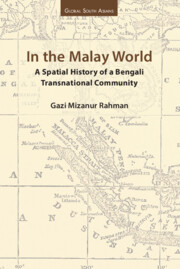Book contents
- Frontmatter
- Dedication
- Contents
- List of Maps
- List of Tables
- List of Figures
- List of Graphs
- Notes on Weighing Scale
- Note on Place Names
- Acknowledgements
- List of Abbreviations
- Prelude
- 1 Contexts, Routes and Nodal Points
- 2 The Bengali: Terminological Ambiguity and Demographic Profile
- 3 Governance of Migration and Diaspora
- 4 Professionals and the Working Class
- 5 In the World of Trade and Commerce
- 6 Tales of Tears, Fears and Pleasures
- 7 The Making of a Diasporic Space: Social and Political Dimensions
- 8 The Making of a Diasporic Space: Civil Society
- Epilogue
- Appendix
- Glossary
- Bibliography
- Index
8 - The Making of a Diasporic Space: Civil Society
Published online by Cambridge University Press: 28 November 2024
- Frontmatter
- Dedication
- Contents
- List of Maps
- List of Tables
- List of Figures
- List of Graphs
- Notes on Weighing Scale
- Note on Place Names
- Acknowledgements
- List of Abbreviations
- Prelude
- 1 Contexts, Routes and Nodal Points
- 2 The Bengali: Terminological Ambiguity and Demographic Profile
- 3 Governance of Migration and Diaspora
- 4 Professionals and the Working Class
- 5 In the World of Trade and Commerce
- 6 Tales of Tears, Fears and Pleasures
- 7 The Making of a Diasporic Space: Social and Political Dimensions
- 8 The Making of a Diasporic Space: Civil Society
- Epilogue
- Appendix
- Glossary
- Bibliography
- Index
Summary
International migrants in Malaya frequently engaged in social and associational activities, often leading to the growth of what may be termed a diasporic civil society. Civil society organisations created a public space in urban areas to secure their interests and represent themselves through various activities, including social services, acts of community solidarity, policy advocacy and cultural activities. Each generation of migrants made its imprint by creating new organisations or promoting existing ones. The Bangla-speaking diaspora shared a similar historical process for space-making in Malaysia and Singapore. The previous chapter focused on Bengali place-making from the lens of political organisations and activism. This chapter explores further Bengali contributions to place-making from the vantage point of civil society, including associational and other activities. The binary processes of globalisation, that is, ‘globalization of the local’ and ‘localization of the global’, could help to articulate the role and engagement of Bengali migrants in the local and international sphere, especially since the end of WWI.
Bengali Civic Spaces within the South Asian Diaspora
During the early twentieth century, South Asian transnational communities formed different organisations under the umbrella term ‘Indian’ mainly for three reasons. First, despite different ethnic backgrounds, the Indian diasporic communities were open to forging cooperation. The Bengalis, among other diverse South Asian migrants, played a vital role in forming organisations and associations of a social and religious nature. For example, Hindu migrants disseminated the idea of reforming Hinduism in Malaya. S. N. Bardhan, a Bengali, was a founding member of the Arya Samaj Sangam, established in 1910. Later, he served as its president from 1911 to 1919. Adi Dravida Sangam, another Hindu reformist organisation, was founded in the 1920s in Singapore. S. C. Goho frequently arranged dialogues there on the Hindu religion. Apart from the religious debates, members of Hindu religious associations occasionally placed their demands before the government. For instance, delegates from the Arya Samaj, Dravida Sangam and Vivekananda Sanmarga Sangam appealed to Singapore's government to introduce an ordinance for the registration of Hindu marriage in the Straits Settlements.
- Type
- Chapter
- Information
- In the Malay WorldA Spatial History of a Bengali Transnational Community, pp. 180 - 206Publisher: Cambridge University PressPrint publication year: 2025

